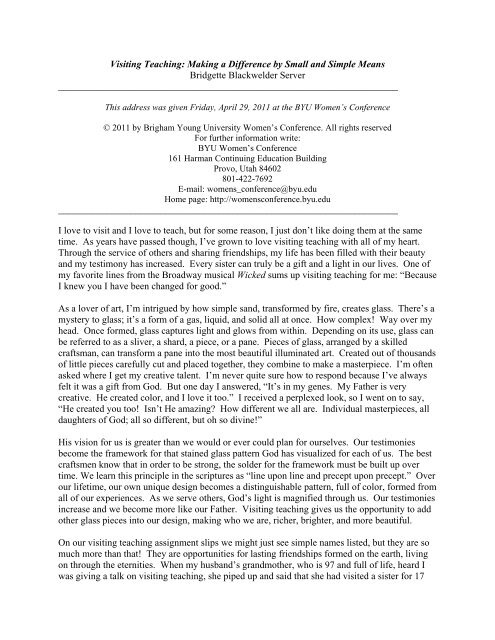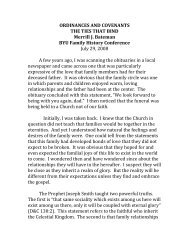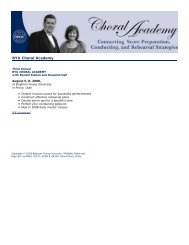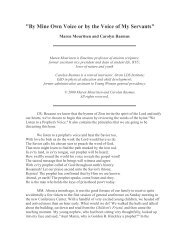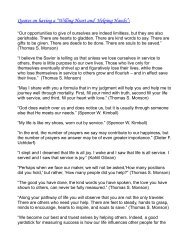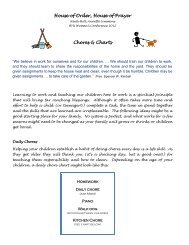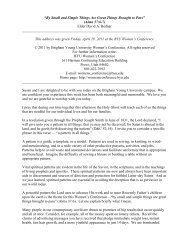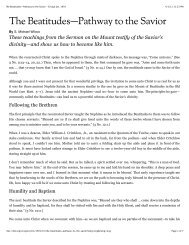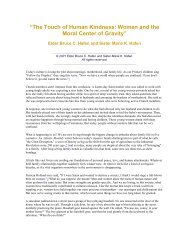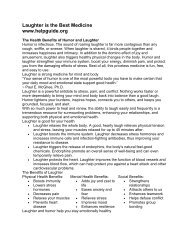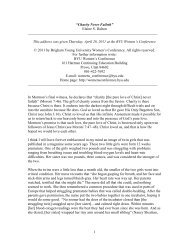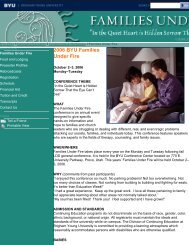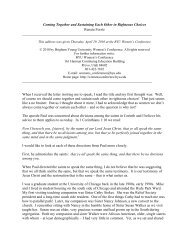Bridgette Blackwelder Server - Continuing Education - Brigham ...
Bridgette Blackwelder Server - Continuing Education - Brigham ...
Bridgette Blackwelder Server - Continuing Education - Brigham ...
Create successful ePaper yourself
Turn your PDF publications into a flip-book with our unique Google optimized e-Paper software.
Visiting Teaching: Making a Difference by Small and Simple Means<br />
<strong>Bridgette</strong> <strong>Blackwelder</strong> <strong>Server</strong><br />
______________________________________________________________________<br />
This address was given Friday, April 29, 2011 at the BYU Women’s Conference<br />
© 2011 by <strong>Brigham</strong> Young University Women’s Conference. All rights reserved<br />
For further information write:<br />
BYU Women’s Conference<br />
161 Harman <strong>Continuing</strong> <strong>Education</strong> Building<br />
Provo, Utah 84602<br />
801-422-7692<br />
E-mail: womens_conference@byu.edu<br />
Home page: http://womensconference.byu.edu<br />
______________________________________________________________________<br />
I love to visit and I love to teach, but for some reason, I just don’t like doing them at the same<br />
time. As years have passed though, I’ve grown to love visiting teaching with all of my heart.<br />
Through the service of others and sharing friendships, my life has been filled with their beauty<br />
and my testimony has increased. Every sister can truly be a gift and a light in our lives. One of<br />
my favorite lines from the Broadway musical Wicked sums up visiting teaching for me: “Because<br />
I knew you I have been changed for good.”<br />
As a lover of art, I’m intrigued by how simple sand, transformed by fire, creates glass. There’s a<br />
mystery to glass; it’s a form of a gas, liquid, and solid all at once. How complex! Way over my<br />
head. Once formed, glass captures light and glows from within. Depending on its use, glass can<br />
be referred to as a sliver, a shard, a piece, or a pane. Pieces of glass, arranged by a skilled<br />
craftsman, can transform a pane into the most beautiful illuminated art. Created out of thousands<br />
of little pieces carefully cut and placed together, they combine to make a masterpiece. I’m often<br />
asked where I get my creative talent. I’m never quite sure how to respond because I’ve always<br />
felt it was a gift from God. But one day I answered, “It’s in my genes. My Father is very<br />
creative. He created color, and I love it too.” I received a perplexed look, so I went on to say,<br />
“He created you too! Isn’t He amazing? How different we all are. Individual masterpieces, all<br />
daughters of God; all so different, but oh so divine!”<br />
His vision for us is greater than we would or ever could plan for ourselves. Our testimonies<br />
become the framework for that stained glass pattern God has visualized for each of us. The best<br />
craftsmen know that in order to be strong, the solder for the framework must be built up over<br />
time. We learn this principle in the scriptures as “line upon line and precept upon precept.” Over<br />
our lifetime, our own unique design becomes a distinguishable pattern, full of color, formed from<br />
all of our experiences. As we serve others, God’s light is magnified through us. Our testimonies<br />
increase and we become more like our Father. Visiting teaching gives us the opportunity to add<br />
other glass pieces into our design, making who we are, richer, brighter, and more beautiful.<br />
On our visiting teaching assignment slips we might just see simple names listed, but they are so<br />
much more than that! They are opportunities for lasting friendships formed on the earth, living<br />
on through the eternities. When my husband’s grandmother, who is 97 and full of life, heard I<br />
was giving a talk on visiting teaching, she piped up and said that she had visited a sister for 17
years and that now they had been friends for over 30. What a treasure and comfort she created<br />
through her service!<br />
While serving as a Relief Society president, many visiting teachers would tell me the “active”<br />
sisters they had been assigned to didn’t want to be visited, making comments like “I’m good” or<br />
“I don’t need anything, so don’t worry about coming to visit me.” How shortsighted! Might their<br />
attitude have changed if they knew that their visiting teacher specifically needed to teach a strong<br />
sister to develop and fortify her own testimony? Or that maybe the life experiences shared by<br />
the sister being visited might lift a struggling sister that comes to receive blessings as a visiting<br />
teacher.<br />
What is our motivation to visit or be visit taught? Are we doing it with a willing, cheerful heart,<br />
or are we going through the motions? Do we visit teach because we know we’ll be called and<br />
asked for our report? Or do we do it out of the pure love we have for our sisters? Are we<br />
rushing to get it marked off our to-do list, or are we finding a way to constantly gear our service<br />
to them and fulfill their needs? Elder David A. Bednar talked about overcoming the mind and<br />
changing our heart. He said, “The gospel…encompasses much more than avoiding…sin….<br />
It…essentially entails doing good, being good, and becoming better....To have our hearts<br />
changed by the Holy Spirit.…This mighty change is not simply the result of working harder or<br />
developing greater individual discipline. Rather, it is the consequence of a fundamental change<br />
in our desires, our motives, and our natures made possible through the Atonement" (“Clean<br />
Hands and a Pure Heart,” Ensign, November 2007). So, if our hearts are truly changed, we will<br />
go visiting teaching for the right reasons.<br />
In my earthly family, I feel especially thankful for a mother and father who were examples of<br />
true service and diligence to the gospel. They taught me how the gospel really works. It requires<br />
a lot of love and a lot of hard and sometimes inconvenient service. In Moses 1:39 we read, “This<br />
is my work and my glory—to bring to pass the immortality and eternal life of man.” In my<br />
parents’ quest to give meaning to this scripture my dad was never without his toolbox. “A<br />
toolbox?” you might ask. How does that help the Lord bring to pass immortality? Well, my dad<br />
knew that no woman would ever shut the door on a man holding a toolbox and asking her what<br />
she needed fixed. And likewise no man would be upset at the offer to help him remove an item<br />
or two from his “honey do” list. And it’s ironically convenient that it takes awhile to fix most<br />
things, especially if you’re having a spiritual discussion as you go. My dad’s toolbox has been<br />
the catalyst for bringing to pass the “eternal life” of many souls.<br />
We receive our testimony of visiting teaching by doing it the best we can. This testimony might<br />
not happen overnight and usually requires many years of service to achieve. To borrow the<br />
imagery used in our last conference from Elder Bednar, this experience may not be like a light<br />
switch, turned on instantly, but more like a sunrise, happening gradually over time. If you’ve<br />
had a powerful experience as a visiting teacher or teachee, one that’s truly affected you, then you<br />
know how it can change lives. But how do we gain a testimony like that? You gain it by<br />
opening your own spiritual toolbox. Like a true craftsman, there are four simple tools.<br />
First, love. It’s as simple as that—just love. As Mother Teresa said, “Do small things with great<br />
love.” We convert with love. We all want to feel understood and needed, accepted and loved.
Sisters, we are tender, we are sensitive, and we feel intense emotions. Let us use these attributes<br />
for good, as they are our finest expressions of love. We can give numerous compliments, but our<br />
human nature tends to always remember that one hurtful thing said or done. If this has happened<br />
to you, turn to your Savior. Let Him heal you.<br />
Neglect, judgment, criticism, rejection, or even a betrayal of trust can be like a shard of glass,<br />
causing deep hurt. Often unseen by others, the wound may heal but leaves lasting scars. When a<br />
sister has been shattered by the carelessness of another, God’s light cannot shine through as<br />
beautifully. While those who love her can pick up the damaged shards and try to place them<br />
back together with God’s help, it is no easy task, and it could have been avoided in the first place<br />
with appropriate love.<br />
Because of our assignment, we may be privy to precious information about a sister. Be careful.<br />
Know that disseminating any information other than to leaders in authority, such as the visiting<br />
teaching supervisor, Relief Society president or the bishop, can do lasting damage. The beautiful<br />
mosaic of someone’s life can be shattered in an instant by uncaring hands.<br />
When we love a sister, we value her as an individual. We show a loving concern for her needs.<br />
When we love, we encourage and buoy her up. When we love, we don’t look for differences or<br />
what we don’t have in common, but we try to find what we share. And we always share the<br />
gospel. If she is unique, love her for all her uniqueness. When we love her, we are sharing the<br />
gospel with her. We teach her the essential principles of everlasting faith and salvation. A wise<br />
bishop said, “The world focuses on what we can do so people will love us. The gospel of Jesus<br />
Christ teaches what we must do so that we will love others. In reality we can’t control who loves<br />
us, but we are in control of who we love. The great secret of love is that we love those we serve”<br />
(Bishop Stephen Morgan).<br />
Since I’m creative, I’m going to share some “creative” interpretations from the section on<br />
visiting teaching in the new Handbook. Now I’m going to read it word for word, but we’re<br />
going to think about it differently. “Visiting teachers sincerely come to know and love each<br />
sister” (emphasis added). Can we “sincerely” know and love with one timed, monthly visit?<br />
Could we perhaps sit by her at church, have her kids over to play, maybe learn a new recipe<br />
together? We don’t just attend the temple once; we attend over and over again to partake of its<br />
blessings. The more we go, the closer to the Lord we feel. We can apply this same principle to<br />
visiting teaching; the more we go, the closer we will become to that sister.<br />
When I was given this speaking assignment, a less-active friend strengthened me. I shared with<br />
her how unqualified and overwhelmed I felt. She buoyed me up and gave me confidence and<br />
then made this priceless statement: “The only way I would ever be an active Mormon again is<br />
through visiting teaching. It’s not like I’m just going to show up to church one day.” She shared<br />
how much love she felt from the sisters who visited her as they just loved her. She never felt<br />
judged by them. She has since moved, and I no longer visit her, but she is my eternal friend. Oh<br />
how I wish the visiting teachers in the wards that she has lived in since knew the friendship they<br />
were missing by not seeking hers. I wish they knew the impact that their service could make to<br />
bring my friend closer to our Savior.
Tool number two, pondering. Reflect on your sister. What would God have you do? As we<br />
read and ponder the scriptures, our minds become inspired. Passages take on different meanings<br />
as we apply them to those we serve. Look for topics to discuss or assistance the scriptures can<br />
offer for each sister. You will be enlightened. The next paragraph in the Handbook reads, “They<br />
seek personal inspiration to know how to respond to the spiritual and temporal needs” (emphasis<br />
added). If a sister struggles to open her home, could we respond by meeting her for lunch, or at<br />
the park, discussing a book at the library? Since we are all so busy, could we maybe exercise<br />
together to fulfill a temporal need? Yes! Could we build friendships as we walk and talk down<br />
the street? Likely! And don’t forget, it’s okay if your companion can’t go at the same time you<br />
can. Maybe she can go on another day without you!<br />
Third, pray. Pray to be filled with God’s love. If you are struggling, pray for a stronger desire to<br />
serve. Pray to know the divinity of your calling as a visiting teacher. If the sisters you are<br />
assigned to visit are hard to love, pray and ask Heavenly Father to teach you what He loves about<br />
them so that you can learn to love them too. Pray for your companion’s heart to be softened if<br />
she is choosing not to participate. Pray for insight into your sister’s needs. Pray for the heavens<br />
to be opened for her. Ask the Lord, “What is my part in Thy plan for this sister?” God’s help is<br />
available for even the smallest problem.<br />
While I was the Relief Society president, I prayed about which sisters I might visit. Four less-<br />
active sisters came to mind. How could my companion and I share the gospel better with them?<br />
As their president, I barely made it through their door in four years. I had to ponder how to reach<br />
each of them. I had to think outside the box: stealth visits. To make contact with one sister, I<br />
drive 30 minutes to exercise at her gym. She trains me with a physical workout while I give her<br />
a spiritual one. We talk about life, and we have become great friends. One day I asked her why<br />
she didn’t go to church. “Got out of the habit,” she said. I told her that’s exactly what happened<br />
to me with exercise. I used that old worn-out analogy about “flexing our spiritual muscles each<br />
day,” relating the gospel to something she understood. It was new to her, and we discussed the<br />
gospel more.<br />
Over time she’s told me of her daily struggles and gospel challenges as she has trained me. As<br />
prompted by the Lord, I’ve been able to weave into our conversations bits of gospel truths. If<br />
she challenges me to do something, I challenge her to some gospel exercise too. When she’s<br />
sick, I bring her soup. When she has trials or joys, she proactively calls me now. I know her<br />
needs, and she knows that I love her. At one of my workouts recently she told me that some<br />
“church people” had come over. She said that she told the “new” president that she hadn’t been<br />
visit taught by anyone. The new president told her she was going to “fix that.” I confessed right<br />
away to being her visiting teacher, and then she said, “But you’re just my friend.” She’s not<br />
coming to Church every Sunday, and I’m not skinny yet, but we’re both working on it.<br />
So let’s get back to the Handbook. “Taking into account each sister’s individual needs and<br />
circumstances, visiting teachers have regular contact (monthly if possible) with those they are<br />
assigned” (emphasis added). I don’t think a doctor would classify “regular exercise” as once a<br />
month. Let’s not inhibit our visiting teaching by just doing the minimum required. Let’s pray to<br />
change our hearts, our attitudes, and serve to the maximum capabilities our Heavenly Father
gave each one of us.<br />
Fourth, revelation. Be ready and worthy to receive revelation to help your sisters. Draw close to<br />
the Savior because without revelation, we cannot succeed in this effort. Sister Beck teaches us<br />
the “The ability to qualify for, receive, and act on personal revelation is the single most<br />
important skill that can be acquired in this life” (“And Upon the Handmaids in Those Days Will<br />
I Pour Out My Spirit,” Ensign, May 2010). It is truly a skill, built over time.<br />
Now to receive revelation, do we have to be perfect? No, it is not required or possible. But our<br />
sisters depend on our inspiration from God to help them. The Lord will prompt us in the ways<br />
we’ll understand. When we receive a prompting, act on it right away, not later. We need to<br />
confidently rely on the Spirit to guide our efforts. What can each of you do this month to<br />
increase your ability to receive this type of personal revelation?<br />
How does revelation apply to the handbook? “When appropriate, visiting teachers share a<br />
gospel message” (emphasis added). You will know if they don’t want a spiritual message.<br />
Instead, bring a message of love. Last month President Uchtdorf quoted St. Francis of Assisi,<br />
who said, “Preach the gospel at all times and when necessary use words.” I love that. That is<br />
true visiting teaching. Instead of the typical living-room venue, could we drive to the grocery<br />
store together, saving on gas, and just talking about life? Maybe even spiritual experiences we<br />
have during the week until we got there? Maybe talk about cats, even if we don't like cats but<br />
they do. We might even grow to love them—cats, that is. Plug in anything that might help your<br />
relationship grow. Instead of reading the lesson word for word, could we share what the lesson<br />
means in our own lives? After we’ve been to the grocery store for a few months, could we<br />
maybe tailor the message to a personal issue we know she’s struggling with, since while walking<br />
down the aisles, she’s finally opened up and we know what her needs really are?<br />
Now that we have our spiritual tools, we need to do. We might start by doing the right thing for<br />
the wrong reasons, but over time, by doing, our hearts will become softened and change. As we<br />
grow, understand, and mature in the gospel, we will consistently do the right things for the right<br />
reasons. As we choose His way, he offers this promise: I will “make weak things become strong<br />
unto them.” Our testimonies of visiting teaching are not going to just magically appear without<br />
any effort on our part. Can you think of at least one thing you can do which will enhance or<br />
change your visiting teaching experience?<br />
Come up with a plan of action. Make an honest effort. Prepare to make sacrifices, be patient<br />
and longsuffering, for it might be a difficult task that requires much time. The Savior said,<br />
“Unto such shall ye continue to minister; for ye know not but what they will return and repent,<br />
and come unto me with full purpose of heart, and I shall heal them; and ye shall be the means of<br />
bringing salvation unto them” (3 Nephi 18:32).<br />
Again, the Handbook gives us important direction. “Where possible, the presidency assigns<br />
sisters into companionships of two” (emphasis added). Key words, “where possible.” Nowhere<br />
in the manual does it say that we have to go together. So we have to do it, but we don’t have to<br />
do it together? What a relief! We can stop the guilt! We are asked to counsel together with our<br />
companion, assess our sisters’ spiritual and temporal needs, and then find ways to meet them,
whether it be together or individually. We can be flexible but we must be diligent.<br />
In the handbook we read, “Visiting teaching focuses on individual sisters, Relief Society leaders<br />
do not organize women in groups for the purpose of visiting teaching” (emphasis added). We<br />
cannot do it in groups because we are not a one-size-fits-all church. We minister to the one, just<br />
like our Savior taught us. We work on an individual basis to meet the needs of each sister. We<br />
must be laser focused on them. Remember there is not one right way to do visiting teaching.<br />
Your effectiveness in reaching the one is only limited by your creativity. Heavenly Father will<br />
help you find a way. If your sisters won’t let you visit them, do something for them. Consider<br />
placing their names on the prayer roll at the temple. Fast for them that their hearts might be<br />
softened. Often we cannot control how a sister might feel about us or about visiting teaching,<br />
but we can make it more meaningful for us.<br />
When we are on the Lord’s errand we are entitled to His help. Sometimes we don’t know how<br />
we are going to do it, but we can be like Nephi, who went forward with faith ‘not knowing what<br />
to do’ (1 Nephi 4:6) but exercised great faith. We know that the Lord will help us and magnify<br />
every righteous effort. This kind of service requires us to step out of our comfort zone and go<br />
forward even into the unknown aspects of visiting teaching stewardship. It can be intimidating,<br />
awkward, overwhelming, and even scary. It is easy to get discouraged, it is easy to quit, but we<br />
must not fail. Too much depends on us.<br />
Perhaps we don’t account for the adversary’s opposition in all “good” things, including visiting<br />
teaching. We tend to blame ourselves. He wants to create a struggle within us. As President<br />
David O. McKay reminds us, “the greatest battle of life is fought within the silent chambers of<br />
the soul” (Conference Report, April 1967, 84-85). Satan plants doubts, like, you’re not a gospel<br />
scholar so how could you teach her? Or “I’m not good at making conversation, so why try?” He<br />
wants us to rationalize, procrastinate, justify, and cheat our souls. He depresses our whole spirit<br />
by making us feel guilty. He does not want us to see, nor others to experience, the powerful<br />
influence we can have. He is battling us for every sister. With busy schedules, he will give us<br />
all the reasons why we can’t get it done. Is busyness perhaps Satan’s weapon of mass<br />
destruction today? Is a mist of darkness, or should we say busyness, clouding our lives? Don’t<br />
let him distract you; visiting teaching is a simple task.<br />
Whatever challenges serve as our excuses—distance, personalities, attitudes, uncaring partners,<br />
the list could go on—we need to put them aside and figure out how to get over our issues. Sister<br />
Beck reminds us, “The Lord doesn’t care about your issues…. He cares about your consecration<br />
and your heart…. We can invent all the issues we want…but if we choose to come into this<br />
great society, this wonderful sisterhood that is here to provide relief, then we become part of the<br />
Lord’s work” (“Visiting Teachers are the Lord’s Agents,” lds.org).<br />
I grew up in a part of the United States where members of the Church lived long distances from<br />
each other. My parents were frequently called as both the home and visiting teacher to a family.<br />
My parents were assigned the Dix family, who weren’t extremely excited about their visits.<br />
Brother Dix let them visit on the stipulation that they didn’t talk about or mention the Church.<br />
Brother Dix seemed annoyed that they were there, but at least, suffered through it. The visits<br />
were painfully awkward for all involved. After living in Boston, my parents moved to
Connecticut. My parents were relieved that this hard assignment was finally over.<br />
Four or five years passed and while sitting in sacrament meeting, the ward clerk read the name of<br />
a new family that moved in with the name Dix. I think my Dad probably shuddered. Later he<br />
asked where this record had previously existed, and the reply was Boston. My Dad volunteered<br />
for the assignment because he knew he could do better this time! The first visit was suspenseful.<br />
When the door opened, Brother Dix recognized our family and immediately hugged us. We<br />
were shocked because we had not realized the impact our relationship had had on him.<br />
However, it didn’t take long until we were back doing the same thing, the same spiral of talking<br />
about everything except what we should be talking about, the gospel. Attending a priesthood<br />
meeting, my dad learned that he was being a “social home teacher” and not really catering to the<br />
spiritual needs of the family. Concerned that the next meeting not only include social<br />
fellowshipping but spiritual as well, my Dad pondered and prayed about how to kick-start the<br />
meeting with a spiritual light. He came up with what he thought was a brilliant idea. At the start<br />
of the next meeting he would begin by saying, “David, I was sitting in priesthood meeting a<br />
couple of weeks ago, and I heard the teacher say that as home teachers, we represent the bishop,<br />
and I should be leaving a spiritual message in the home. I have been remiss in my duties as a<br />
home teacher, and vow to do better and leave such a message for you and your family.” My Dad<br />
thought that taking the blame might just break the ice enough to try and start over with a more<br />
spiritual foundation. No one was prepared for Brother Dix’s answer. He looked my Dad straight<br />
in the eye and said, “I don’t really care to hear a message from your Bishop!” My parents were<br />
floored. My Dad didn’t know what to say. The whole room seemed suspended in time.<br />
Seconds seemed like minutes. My Dad still couldn’t speak, and luckily for him, he didn’t have<br />
to. Brother Dix softened his answer by adding, “Even though we don’t want a spiritual message<br />
from your bishop, that doesn’t mean we don’t want you and your family to come and be our<br />
home teachers and friends!”<br />
My family was just a small piece of glass in their mosaic. The very next summer, the Dix’s were<br />
visiting their family back in Utah. We never learned what occurred that summer, but it was life<br />
changing. Suddenly Sister Dix and her children desired to be active in the gospel. Sister Dix was<br />
eventually called as the Relief Society president. Priesthood ordination came to their son, and<br />
before we knew it, he was off on his mission. His sister followed his example and served a<br />
mission as well. Brother Dix never came to church before we moved, but we’re hopeful that<br />
someone else, through small and simple acts is helping him fill in his mosaic.<br />
My parents’ example lingers in my mind every day. The new handbook states, “Leaders”—and<br />
let me say, we are all leaders of our own families—“Leaders can best teach others how to be<br />
‘true followers’ by their personal example. This pattern—being a faithful disciple in order to<br />
help others become faithful disciples—is the purpose behind every calling in the Church”<br />
(emphasis added). When our example leads the way, they will follow.<br />
If you only remember one thing today, remember love. Have hands that serve and hearts that<br />
love. Love those you visit. Love your companion. Love those who visit you. Let every colorful<br />
piece fall into place in your own beautiful mosaic.
I know that as I do, my love increases. My desire to serve grows. I see the simple plan<br />
Heavenly Father has composed personally, just for me, in vibrant color. Just as the colored<br />
panes in a stained glass window change with the quality and color of sunlight, we will change as<br />
His light becomes brighter in us. Be diligent. As you feel the Spirit guide your work, you will<br />
experience the sweetest joys and the most amazing growth as you help to lead our sisters to the<br />
radiating light of Christ. I testify of these things in the name of Jesus Christ, amen.


